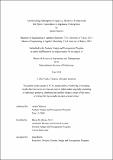| dc.contributor.advisor | Moser, Bryan R. | |
| dc.contributor.author | Yukawa, Ayako | |
| dc.date.accessioned | 2024-07-10T20:16:43Z | |
| dc.date.available | 2024-07-10T20:16:43Z | |
| dc.date.issued | 2024-05 | |
| dc.date.submitted | 2024-06-11T19:54:37.981Z | |
| dc.identifier.uri | https://hdl.handle.net/1721.1/155587 | |
| dc.description.abstract | As Japan faces challenges in maintaining its global innovation leadership, this thesis explores the potential of collaborative R&D between large Japanese firms and external actors to drive innovation through open innovation practices. The research focuses on absorptive capacity - defined as an organization's ability to recognize, assimilate, and utilize external knowledge - as a critical factor in successfully implementing outside-in open innovation. To address the gaps between academic research and real-world implementation of open innovation, the thesis develops a systems framework for understanding and designing absorptive capacity in the context of large Japanese firms. Using a systems architecture approach and conducting case studies of five Japanese companies recognized as high-performing innovators, the research identifies four main capabilities constituting absorptive capacity: management, recognition, assimilation, and exploitation. The framework maps these capabilities to specific architectural decisions and options, linking the theoretical understanding of absorptive capacity as a system to practical choices in designing a firm's absorptive capability. The significant influence of management capability on recognition and assimilation capabilities, as well as organizational structure and needs assessment in driving absorptive capacity as architectural decisions, are also revealed. This thesis is expected to contribute to both academic discourse and practical implementation, extending previous perspectives on absorptive capacity and providing actionable guidance for designing and managing open innovation initiatives for large Japanese firms and policymakers. While limitations of this research include the potential lack of comprehensiveness in architectural decisions and the subjectivity in case study selection, this thesis will serve as a foundation for future studies on establishing Japan's competitive innovation ecosystem on a global scale. | |
| dc.publisher | Massachusetts Institute of Technology | |
| dc.rights | In Copyright - Educational Use Permitted | |
| dc.rights | Copyright retained by author(s) | |
| dc.rights.uri | https://rightsstatements.org/page/InC-EDU/1.0/ | |
| dc.title | Architecting Absorptive Capacity: Systems Framework for Open Innovation in Japanese Enterprises | |
| dc.type | Thesis | |
| dc.description.degree | S.M. | |
| dc.contributor.department | System Design and Management Program. | |
| mit.thesis.degree | Master | |
| thesis.degree.name | Master of Science in Engineering and Management | |
